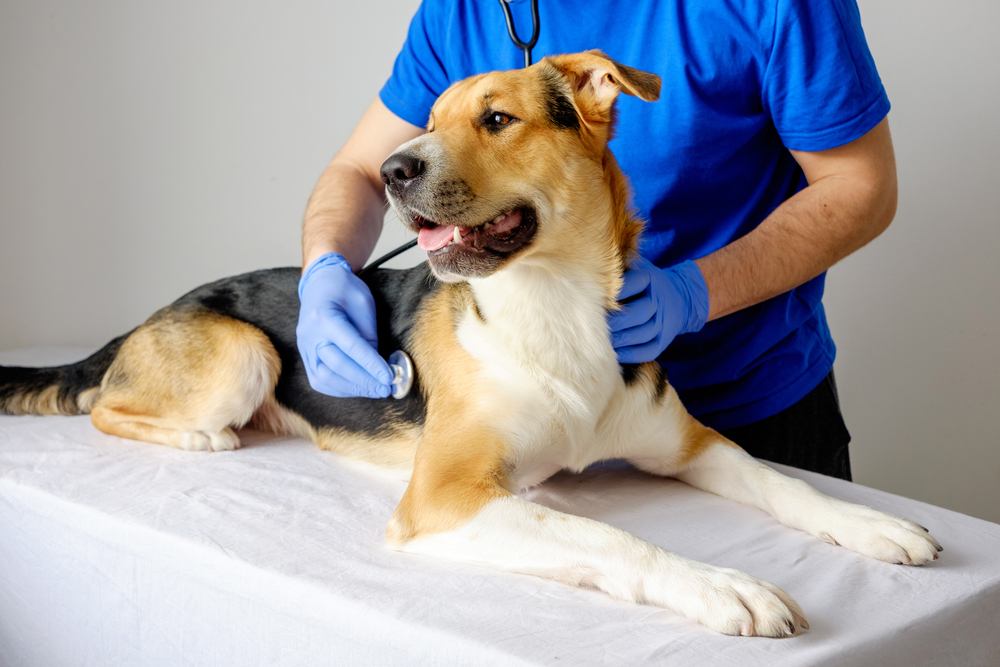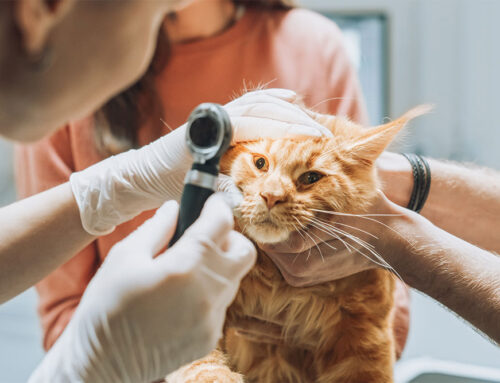Pet Coughs, Snores, and Sneezes: What’s Normal and What’s Not
When your pet lets out an unexpected cough or wheeze, it’s natural- and right- to feel concerned. Is it just a passing irritation, or something more serious? At Livingston Veterinary Hospital in Livingston, Montana, we’re here to help you understand what those sounds could mean, what’s behind them, and when it’s time to seek care.
Understanding Respiratory Sounds in Pets
Pets, like people, make respiratory noises from time to time. Coughing, sneezing, wheezing, and even snoring can all be completely normal- or signs that something isn’t right. Because pets can’t explain what they’re feeling, it’s up to us to pay attention.
Reverse sneezing may sound scary but is usually harmless- though if it becomes frequent, it’s worth investigating. Snoring is another sound that may seem harmless. In flat-faced breeds with brachycephalic airway syndrome, snoring can be a daily occurrence. However, snoring that’s new, loud, or paired with labored breathing should prompt a closer look.
These sounds are the body’s way of clearing irritants or signaling inflammation- but they can also hint at deeper issues, especially when persistent.
What’s Causing the Noise?
There are many potential causes for coughing and sneezing in pets, from minor irritants to serious disease. Here’s a breakdown of the most common categories and examples:
| Category | Examples |
| Infections | Kennel cough, feline upper respiratory infections |
| Allergies & Irritants | Dust, pollen, cleaning products, or smoke. Allergy management can make a big difference. |
| Anatomical Issues | Collapsed trachea, nasopharyngeal polyps in cats and kittens, Brachycephalic Airway Syndrome in flat-faced breeds. |
| Heart Conditions | Coughing due to fluid buildup from congestive heart failure. Diagnosing heart disease can be key. |
| Environmental Hazards | Foxtails and other foreign bodies may lodge in the throat or nose. |
| Parasitic Disease | Heartworm infections can present with coughing, particularly in dogs in endemic areas. |
Some of these conditions are contagious and can spread in shelters or among pets in the same household. Others, like heart disease or allergies, are not- but they still need attention.
In some cases, the cause is multifactorial. For example, a dog with allergies might develop a secondary infection due to persistent inflammation. Or a cat with polyps may also be at risk for chronic infections and sneezing.
Why It Matters
Occasional sneezing or coughing may not be cause for concern, but persistent or worsening symptoms can point to serious illness. Respiratory distress can progress to complications like pneumonia, bronchitis, or heart failure- especially in senior pets or those with underlying health conditions.
It’s also important to understand how chronic respiratory strain can reduce a pet’s overall quality of life. Constant coughing can interfere with sleep, suppress appetite, and lead to exhaustion. In cats, unaddressed respiratory inflammation may trigger asthma flare-ups or long-term airway damage. Dogs may become reluctant to exercise or even lie down if they’re uncomfortable while breathing.
If your pet seems short of breath, is coughing more often, or you’re seeing changes in energy or appetite, it’s time to check in with your vet ASAP.
How to Know When It’s Serious
Pay attention to when and how your pet is making noise. Is it constant or triggered by excitement or activity? Are they still eating, drinking, and behaving normally?
Some red flags to watch for include:
- Coughing that worsens at night or after exercise
- Sneezing with nasal discharge, especially if it’s bloody or yellow
- Wheezing during rest or sleep
- Blue or pale gums, labored breathing, or collapse
- Open-mouth breathing or panting in cats
Open-mouth breathing in cats is never normal and usually signals severe distress. Blue or pale gums indicate oxygen deprivation and require immediate care. Dogs who collapse after activity may have a hidden heart condition or even a ruptured airway structure.
You can review AAHA’s guide on respiratory distress to get a better idea of warning signs.
Diagnosing the Cause
At Livingston Veterinary Hospital, we begin with a thorough exam and health history. We’ll listen to your pet’s lungs and heart, ask detailed questions, and may recommend basic diagnostic testing. In many cases, this includes bloodwork to screen for infection or heartworm disease, or imaging such as X-rays to rule out issues like pneumonia or heart enlargement.
We also consider your pet’s breed, age, environment, and travel history when narrowing down causes. Flat-faced dogs, young kittens, older cats, and pets with recent exposure to other animals each have different risk profiles- and different likely causes behind respiratory symptoms.
Some cases may call for more advanced diagnostics. Rhinoscopy (a camera inside the nasal passages), bronchoalveolar lavage, or heart ultrasound may be needed for persistent, unexplained, or severe cases.

Treatment Plans Tailored to Your Pet
Once we understand the cause, we can build a treatment plan that works for both you and your pet. For most pets, this may include:
- Medications like antibiotics, antihistamines, or steroids
- Inhaled therapies for cats with feline asthma
- Environmental support such as using humidifiers, cleaning air filters, or avoiding air fresheners and aerosols
- Heart medications to reduce fluid buildup and improve cardiac output if heart disease is diagnosed
- Foreign body removal in cases involving foxtails or nasal blockages
- Ongoing monitoring to catch relapses or chronic conditions before they flare
- Great preventive care: Vaccinations, maintaining a proper weight, routine wellness exams, and year-round parasite prevention
We’ll guide you through every step and monitor your pet’s progress as they heal. You don’t need to wait for symptoms to start before taking action. Preventive care guidelines offer simple strategies to protect your pet’s respiratory health year-round.
Let’s Get Your Pet Breathing Better
Respiratory issues can be disruptive- but they’re also treatable. Whether your pet has a mild cough or something more serious, we’re here to help. Our compassionate team at Livingston Veterinary Hospital offers personalized care and clear communication, every step of the way.
Learn more about our services, or contact us to schedule an appointment. Your pet’s health- and your peace of mind- are always our priority.







Leave A Comment